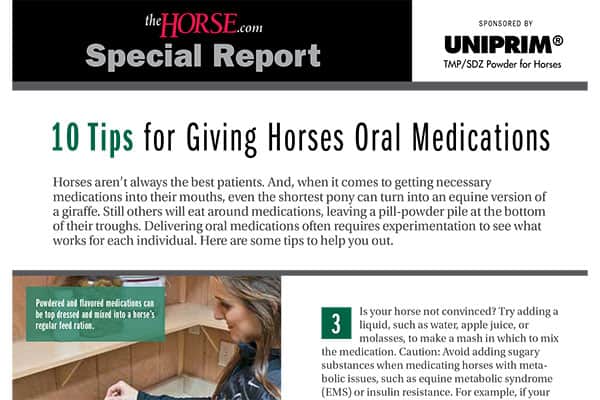
Botulism: Deadly to Horses
Horses are one of the most susceptible species to botulism. Find out how to protect your horse from this deadly neurologic disease.
Proper feeding practices for foals, adult horses, and older horses

Horses are one of the most susceptible species to botulism. Find out how to protect your horse from this deadly neurologic disease.

Magnesium, an important macromineral found in most feedstuffs, plays integral roles in muscle contraction, skeletal growth, and a variety of enzyme systems, such as those involved in energy production.

Does your herd leader get too much to eat while the low man doesn’t get enough? Here’s our expert’s advice.

Researchers determined that the diet and exercise recommendations veterinarians make for horses with PSSM1 can help improve, but likely won’t eliminate, clinical signs of PSSM2 in Warmbloods.

Hay can become a significant fuel source for fires or even cause a fire through spontaneous combustion. Learn how to best store your hay from Alayne Blickle of Horses for Clean Water and Dr. Rebecca Gimenez of Technical Large Animal Emergency Rescue.

Although poison hemlock is often seen along roadways and in other nonagricultural sites, in recent years it has expanded into grazed pasture lands and hay fields. Here’s how to keep your horses and other livestock safe.

Cobalt is required in very small amounts in the equine diet.

As an essential trace element for horses, chromium plays roles in the communication between insulin and insulin receptors, lipid metabolism, and immune function.
The U.S. Food and Drug Administration (FDA) is investigating the deaths of six horses in Minnesota allegedly due to horse feed contaminated with monensin.

Overgrazing, one of the most common threats to pasture and plant health, happens all too often on horse farms. Download this free report to learn about the signs and solutions to overgrazed pastures.

When it comes to getting necessary medications into horses’ mouths, even the shortest pony can turn into an equine version of a giraffe. Here are tips to make medicating easier.

Caring for the older horse can require special attention to his needs. Download this free guide to find out what health issues to watch for and how to keep your senior horse happy and healthy.

Does your performance horse need to pack on a few more pounds? Here are some tips to consider when managing a hard-keeping equine athlete.

Nutritionist Dr. Clair Thunes explains why ration-balancer protein contents might seem high but aren’t.

Learn about special characteristics of each part of the horse’s digestive tract and different medical conditions that can develop there.

Learn more about these trace minerals that are vital to horse health.
Stay on top of the most recent Horse Health news with
"*" indicates required fields